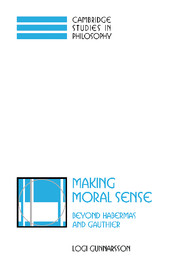Book contents
- Frontmatter
- Contents
- Preface
- PART I PROBLEMS
- PART II AGAINST RATIONALISM
- PART III FOR THE SUBSTANTIVE APPROACH
- 10 Self-understanding and self-assessment
- 11 The possibility of progress
- 12 Practical arguments vs. impossibility arguments
- 13 Evaluation of others
- 14 Universality without neutrality
- PART IV FOR PARTICULARIST SUBSTANTIVISM
- Appendix Transcendental vs. universal pragmatics
- Bibliography
- Index
10 - Self-understanding and self-assessment
Published online by Cambridge University Press: 22 September 2009
- Frontmatter
- Contents
- Preface
- PART I PROBLEMS
- PART II AGAINST RATIONALISM
- PART III FOR THE SUBSTANTIVE APPROACH
- 10 Self-understanding and self-assessment
- 11 The possibility of progress
- 12 Practical arguments vs. impossibility arguments
- 13 Evaluation of others
- 14 Universality without neutrality
- PART IV FOR PARTICULARIST SUBSTANTIVISM
- Appendix Transcendental vs. universal pragmatics
- Bibliography
- Index
Summary
It is time to get back to the main topic of the book: to show that morality does not need a rationalistic justification even if there is a successful justification of this kind available. Thus, whereas I argued in Part II that Gauthier's and Habermas' conclusions do not follow from their premises, I am in this part willing to assume that they do. Here my aim is to argue that the supposition that morality needs a rationalistic justification distorts our view of morality and rationality. I shall proceed by considering the problem of the rationality of morality and by arguing that the substantive approach's solution to this problem should be favored over the solution offered by rationalism.
The problem of rationality arises both in the context of self-assessment and in evaluating others (see chapter 1). Depending on the context, the emphasis gets placed on one or another issue. In the context of self-assessment or self-evaluation, the focus is on such questions as whether a person who guides her life by moral reasons may thereby be losing sight of her real interests. Even if rationalism or the substantive approach were to solve the problem as it comes up in self-assessment, there would still remain the issues of whether and how we can justify the use of morality to evaluate others. This problem becomes particularly pressing when moral norms accepted in one culture are employed as standards to criticize another culture.
- Type
- Chapter
- Information
- Making Moral SenseBeyond Habermas and Gauthier, pp. 129 - 151Publisher: Cambridge University PressPrint publication year: 2000



